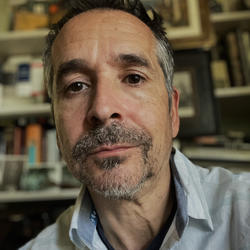Dean Lampros

Dean Lampros teaches cultural history and American Studies at RISD. His current research explores symbolic colonization and the way landscapes, both permanent and impermanent, were used to rewrite history and bolster the ruling elite’s claims to authority in 20th-century New England. His broader interests include intersections between vernacular architecture, material culture, popular culture, mass consumption, race and ethnicity, queerness, politics and historic preservation.
He has contributed chapters to Visual Merchandising: The Image of Selling (Routledge, 2013) and Modernism and American Mid-20th Century Sacred Architecture (Routledge, 2018). His first book, Preserved: A Cultural History of the Funeral Home in America (Johns Hopkins University Press, 2024) uses the previously untold history of an American icon to explore the 20th century’s expanding consumer landscape, hotly contested and rapidly changing interwar neighborhoods and the ways we use the built environment to construct our identities and tell our stories.